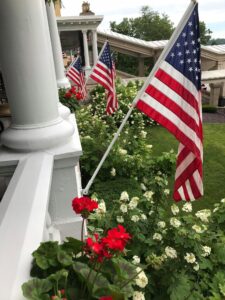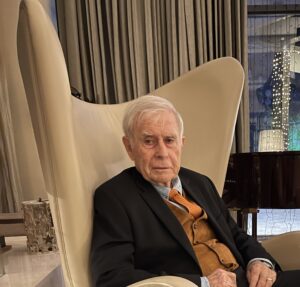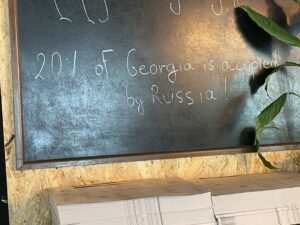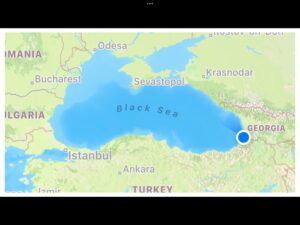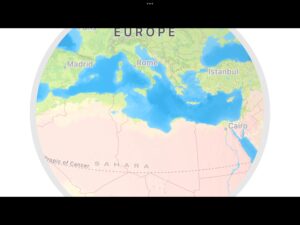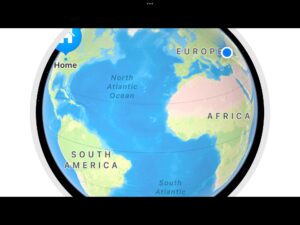
President Kennedy gave his inaugural address January 20, 1961 when I was a senior in high school. He was concerned about the Soviet Union’s 1957 Sputnik achievement and challenged American youth to respond. That September I entered Oklahoma State University and boldly majored in physics. By June 1962 I had learned how to smoke but not learned anything that would raise concerns in Russia. I changed my major to English and then in June 1963 decided to “ask what I could do for my country” without the headaches of college level studies. I became a 1960’s Okie and headed for California. On the way I took my first foray out of the United States to Nogales, Mexico.
My friend and fellow OSU dropout, Ed Kelso, and I drove his 1954 Mercury down to the Mexican border and were waved through without so much as a question, much less a visa. We stopped at the first bar we came to and ran into my old high school classmate Jim Reed and a few other guys from Pawhuska, Oklahoma who were there on a similar journey of cultural discovery. What I noted from my brief sojourn was my high school Spanish was sufficient as long as we had U.S. Dollars. I also received my first faint awareness of how lucky I was to have been born north of the border.
Another foreign country experience was when as a member of the National Judicial College faculty I was sent for two weeks (December 1999-January 2000) to Ukraine to teach Ukrainian judges. I liked the Ukrainian people but found their lives to be quite difficult. The judges told me they frequently did not receive their small monthly salaries and the Ukrainian government often failed to provide them and their families with promised individual family housing. Also, police corruption was in full view on the streets of Kiev and workers who were supposed to help repair such public assets as the fountain in “Freedom Square” did about as much work as I did at Oklahoma State. As the old Soviet saying went, “The government pretended to pay them and they pretended to work.” I left Ukraine with a greater appreciation of what our Founders sacrificed for us.
Then in 2003 the National Judicial College sent me to Russia for a week to teach Russian judges about jury trials. The old Soviet Union abolished jury trials after the 1917 Revolution and Russia was just reinstituting them into their legal system. Peg was able to be with me on that trip and we, once again, found the Russian judges to be friendly and gracious but the Russian culture caused us great chagrin. A good cup of coffee was truly a foreign concept, but the consumption of alcohol was quite prevalent. The idea of innocent unless proven guilty was belied by the defendants being housed in metal and plastic cages in the courtroom. And when a defendant on trial for murder was marched into the courtroom by four AK47 carrying uniformed guards right in front of the jury, my American sense of justice was assaulted. It was good to get back to my Indiana courtroom with its guarantees of equal justice. Russia was interesting, but the United States was good to come home to.
Most recently (June 2022-February 2023) Peg and I completed a six-month judicial teaching mission sponsored by the American Bar Association, the East-West Management Institute and the United States Agency for International Development. I was sent to the country of Georgia that until 1991 had been part of the old Soviet Union. My duties were to make friends, observe, work with and give suggestions to Georgian judges based upon my more than forty years of experience as an American judge.
We had a wonderful experience with the Georgian judges and our newly-made Georgian friends. They could not have treated us any better. Everyone we met was positive about our involvement and open to suggestions. We would gladly return to Georgia whenever invited. Of course, we did note substantial differences between the Georgian culture and America’s. Georgia is bordered on the north by Russia and on the south by Turkey. Twenty percent of Georgia is militarily occupied by Russia; that is a constant worry for the Georgian people. Peg and I thought how different our lives in America are. Our northern border is Canada which we visited in 2018 and is about as good a neighbor as any country could have. And our southern border is Mexico that appears to want to join us.
What this 2023 Fourth of July birthday party has helped us to reflect upon is, no matter how much CNN, MSNBC, FOX News and many in government service complain about America and malign it, many of the alternatives are pretty scary. After seeing how some of the rest of the world has to live, I find the ’ole USA absolutely marvelous. America has faults and foibles, but as Francis Scott Key wrote, it is really wonderful, “That our flag is still there.”

